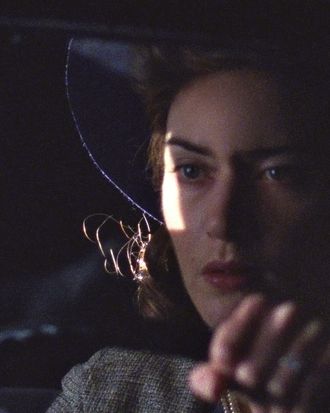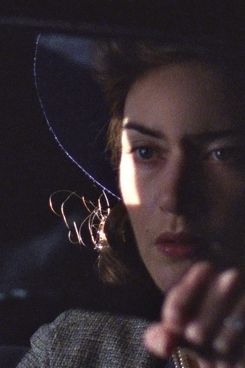Sixty-five years after the Joan Crawford film version of the James M. Cain novel Mildred Pierce, Todd Haynes has made what he considers a more faithful adaptation of the melodramatic novel. To do so, he made it as an HBO mini-series, giving him five-and-a-half hours to tell the story (the first two parts air Sunday). A mini-series allows a filmmaker to do justice to a novel’s textures, details, and layers that often have to be stripped out in a two-hour feature. Which made us wonder: What other great books that have previously had truncated big-screen adaptations would be better remade this way? Some ground rules: This list only includes books that have already been made into movies, exempting some works that would make a hell of a marathon, like The Confederacy of Dunces and Don DeLillo’s Underworld. It also doesn’t include films that had crappy movie adaptations, but which still could decently be done in two hours, like Red Badge of Courage, famously butchered by John Huston.
What the Film Got Right: Henry Fonda’s performance in the 1940 film was a compelling mix of steel and fragility; John Ford and cinematographer Greg Toland’s documentary-style filming captured the endless reach of poverty during the Depression.
What the Film Got Wrong: Too many thinly developed characters (Noah, Connie, Grandpa) border on caricature while Jane Darwell’s pivotal performance as Ma Joad doesn’t hold up well. Worst of all, Ford’s portrait of one family’s struggle toned down, or dispensed with, Steinbeck’s politics, especially his scathing attack on unfettered capitalism.
What a Mini-series Could Do: Steinbeck’s book was a clarion call for unions and a new approach to capitalism that, in the wake of Wisconsin’s new laws, seems more timely than ever. The movie often jumps too quickly to the next episode, while a mini-series could build the narrative momentum. Additionally, a skilled director might find a way to incorporate the prose poem interludes that adorned the novel and to bring the controversial ending — totally ditched by Ford — to life.
Names We Want Attached: Winter’s Bone director Debra Granik behind the camera. For cast: Pablo Schreiber has the restlessness and anger for Tom Joad, John Hawkes is perfect for preacher John Casey, and either an unknown as Ma Joad or, why not, Meryl Streep.
What the Film Got Right: The 1986 adaptation loses sight of Wright’s goals, though it does generate dramatic tension and sympathy for the tortured Bigger Thomas. He’s well-played by Victor Love amidst an uneven cast that includes a stiff Carroll Baker as Thomas’s blind patron, an out-of-place Matt Dillon as the young Communist Jan — and Oprah Winfrey as Bigger’s mother.
What the Film Got Wrong: Wright didn’t want Thomas to be sympathetic — he was using Thomas to indict an unjust system. Thomas accidentally kills a white woman but purposely murders a black one; the fact that the law only prosecutes him for the former was a large part of Wright’s political message. By cutting out that second killing entirely, the movie misses the point as it does again by cutting out the political ideology of the trial scene. Also, a tacky synthesizer score in a 1930s period piece is a definite distraction.
What a Mini-series Could Do: A filmmaker would have time to show both murders and the trial in full, laying out Wright’s case. The catch is that Wright was often didactic, so making this work dramatically would require a filmmaker willing to flesh out the characters beyond the original portrayals.
Names We Want Attached: The hot choice would be Lee Daniels (Precious) but Charles Burnett (To Sleep With Anger) also seems suited to this challenging material.
What the Film Got Right: James Caan is captivating in the hard-to-find 1970 version (which we can only locate through Amazon on-demand right now). As the restless, selfish, pregnant-wife-deserting Rabbit Angstrom, the actor mixes Brian Piccolo’s charm and Sonny Corleone’s impetuousness. Occasionally, director Jack Smight adds personal touches that one-up Updike — when Rabbit tells his new girlfriend Ruth (who is also a prostitute) that he must go because his wife is giving birth, Smight puts Rabbit in the background and focuses on Ruth’s face as she fights back tears so we can see the hurt Rabbit causes. (In the book she is silent with her back to Rabbit and thus to the reader.)
What the Film Got Wrong: Unlike Rabbit, Jack Smight is too faithful: Like many adaptors, he thinks lifting scenes and chunks of dialogue straight from the page makes everyone happy. Too often, however, those scenes don’t translate without a narrator, the dialogue doesn’t sound natural, and the selected snippets are confusing without the rest of the author’s words. (Also, the theme song, “Anything Happening,” is such a clichéd piece of late sixties dreck it sounds like something Christopher Guest would write as a parody.)
What a Mini-series Could Do: Hell, it could be a series: By using all four Rabbit novels, HBO or AMC could bring an audience back for hour after hour, all the way up to his death.
Names We Want Attached: The angst, the small life moments, the gradual evolution of the character. It seems so perfect for TV, so how about the thirtysomething team of Ed Zwick and Marshall Herskovitz? And Rabbit’s cruel misogyny would be well suited to a TV deal with Neil Labute.
What the Films Got Right: George Roy Hill’s 1972 Slaughterhouse Five does a decent job in the war scenes, and it’s hard to complain about the young Valerie Perrine’s scenes as a sexpot.
What the Films Got Wrong: Alan Rudolph’s 1999 Breakfast of Champions is relentlessly zany and fairly unwatchable. Slaughterhouse Five botches the attempts at absurdism, especially the scenes on the planet Trafalmadore and of Billy Pilgrim with his family. The inconsistent movie captures Vonnegut’s despair but none of his faint hope or yearning. Hill also didn’t use the melancholy phrase “So it goes” even once, which seems like heresy.
What a Mini-series Could Do: With room to roam, a filmmaker could create a work that incorporates not only these two books but some of the many others from Vonnegut’s oeuvre in which both Kilgore Trout and Vonnegut himself make appearances. The result could be either sublime or ridiculous, in the best sense.
Names We Want Attached: Get Charlie Kaufman to write the teleplay. Even better if he can bring in his previous collaborators Spike Jonze or Michel Gondry.
What the Film Got Right: Um, there must have been something decent in there somewhere.
What the Film Got Wrong: Everything. Brian De Palma was the wrong choice to direct a dark and sophisticated piece of social commentary, and Tom Hanks instantly made Sherman McCoy (described by Wolfe as “imperious”) more likeable than he was intended to be, thus distorting the entire film. Bruce Willis is as bad in this as he would later be in Breakfast of Champions.
What a Mini-series Could Do: Tom Wolfe’s strength is in his reportorial approach, the damning evidence brought on by the accumulation of detail. A mini-series would provide the time to tell this story right, giving all the characters room to develop — It could be The Wire amongst the Park Avenue set. And a story looking at the excesses of Wall Street would make a nice companion to that Grapes of Wrath mini-series.
Name We Want Attached: Alexander Payne seems to be a keen observer of human foibles and a subtle satirist in ways De Palma could never imagine.
What the Film Got Right: If you want a soapy melodrama with top-tier talent — Jason Robards, Michelle Pfeiffer, Jessica Lange, Jennifer Jason Leig, and even a young Colin Firth — then it’s not half-bad.
What the Film Got Wrong: However, if you want a saga with the ambition and sweep of King Lear — a father of three daughters splits his estate and instead divides his family — which is what Smiley modeled her novel on, well, sorry. Much of the nuance has been swept away; the details of the family history and the struggle of modern farming were the connective tissue that gave Smiley’s story much of its power. The book’s ending, in which one sister seethes for years after a betrayal by her ally, is largely neutered in the movie.
What a Mini-series Could Do: The broad-stroke storylines could still attract big name actors and audiences alike while the extra hours would allow a director to create a realistic, less breathless story that still has the epic power of the novel.
Names We Want Attached: Jane Campion (The Piano) can tell stories intimate in scope, but can also give this epic a sense of grandeur.
What the Film Got Right: Tom Hanks gave the “idiot” Gump a pity-free portrayal, and for millions of viewers (and Oscar voters), Robert Zemeckis’ film was a charming and quotable instant classic.
What the Film Got Wrong: Then there are the many detractors who found the cloying, cutesy tone as unappealing as a Whitman Sampler left in the hot sun. But putting positive or negative emotion aside, it was objectively not a great adaptation of the book. Groom’s protagonist was 6’6” and 240 pounds, he cursed up a storm, and he was far from oblivious to the horrors of the war in Vietnam. Groom’s storytelling is more cynical and far less sentimental, both in his take on America and in Gump’s understanding of the world around him, and the ending involving Gump’s lost love Jenny and his newly discovered son is far less mushy.
What a Mini-series Could Do: To make the movie work, it narrowed the focus to the love story with Jenny. But the book’s episodic nature lends itself well to television, and the novel’s less saintly version of this beloved character is far more interesting. Gump’s journey from a harmonica player in an up-and-coming band, to a stoner who blows it all, to a chess wizard who ends up with his tournament career undone after he lands a bit part in a Hollywood B-movie would keep viewers coming back week after week.
Names We Want Attached: Brad Garrett as Forrest Gump. It’s hard to imagine with that image of Hanks in your mind (and
things like this) but read the book and it’ll make sense.













